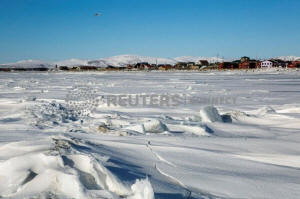Climate change hitting top U.S. fishery in the Arctic: NOAA
 Send a link to a friend
Send a link to a friend
 [December 11, 2019]
By Timothy Gardner and Yereth Rosen [December 11, 2019]
By Timothy Gardner and Yereth Rosen
WASHINGTON/ANCHORAGE (Reuters) - Climate
change is causing chaos in the Bering Sea, home to one of America's
largest fisheries, an example of how rising temperatures can rapidly
change ecosystems important to the economy, U.S. federal government
scientists said in a report on Tuesday.
Rising temperatures in the Arctic have led to decreases in sea ice,
record warm temperatures at the bottom of the Bering Sea and the
northward migration of fish species such as Pacific cod, the U.S.
National Oceanic and Atmospheric Administration, or NOAA, said in its
2019 Arctic Report Card.
While the changes are widespread in the Arctic, the effect on wildlife
is acute in the eastern shelf of the Bering Sea, which yields more than
40% of the annual U.S. fish and shellfish catch.
"The changes going on have the potential to influence the kinds of fish
products you have available to you, whether thatís fish sticks in the
grocery store or shellfish at a restaurant," said Rick Thoman, a
meteorologist in Alaska and one of the report's authors.

The warning was the latest from a U.S. government agency about climate
change even as President Donald Trump has voiced skepticism about global
warming and pushed to maximize production of oil, gas and coal. Last
month his administration filed paperwork to withdraw the United States
from the 2015 Paris agreement on climate change.
The report identified a decrease in recent years in the Bering Sea "cold
pool," which used to be a dependable mass of very salty frigid water
down to the sea floor that functioned as a natural fence separating fish
species. That has likely caused a shift in distribution of walleye
pollock and Pacific cod, the report said.
No cold pool was found in 2018 and this year it was smaller than normal,
it said.
Fish stocks are scrambled, with some species moving north. Crab
fishermen in Nome have reported catching more cod than crabs, as Pacific
cod are not doing as well south of there. Last week, the North Pacific
Fishery Management Council shut down the 2020 Pacific cod harvest in the
Gulf of Alaska.
[to top of second column]
|

A frozen beach on the Bering Sea coast is seen near the last stretch
mushers must pass before the finish line of the Iditarod dog sled
race in Nome, Alaska, March 11, 2014. REUTERS/Nathaniel Wilder/File
Photo

"It's heartbreaking," said Simon Kinneen, the chairman of the North
Pacific Fishery Management Council. Cod stocks have been hard hit by
successive heat waves in the Gulf of Alaska, fishery scientists say.
The report also said the melt of the ice sheet over Greenland this
year rivaled that of 2012, the previous year of record ice loss.
It also detailed a shift of Arctic permafrost regions from being a
sink for carbon dioxide emissions to a source of them, as warming
uncovers soil, triggering microbes to emit the main gas linked to
global warming.
The wide ecosystem changes also affect the 70 communities of
indigenous people in the Bering Sea, with hunters seeking seals,
walrus, whales and fish having to travel much farther offshore as
the ice melts.
"Our hunters are finding it more difficult to navigate on the land
and are moving out to sea," Mellisa Johnson, the executive director
of the Bering Sea Elders, told a meeting in San Francisco of the
American Geophysical Union, where the report was released.
Scientists said warming in the Arctic, which functions as a global
air conditioner, could lead to rapid changes far away from the
region.
"Two years ago nobody was talking about a wholesale shift in the
Bering Sea ecosystem," Thoman said.
(Reporting by Timothy Gardner in Washington and Yereth Rosen in
Anchorage; Editing by Dan Grebler)
[© 2019 Thomson Reuters. All rights
reserved.]
Copyright 2019 Reuters. All rights reserved. This material may not be published,
broadcast, rewritten or redistributed.
Thompson Reuters is solely responsible for this content.
 |